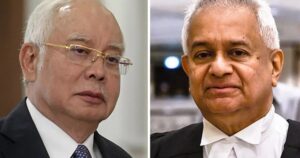
From Shad Saleem Faruqi
Now and then, the placid surface of the constitutional lake is buffeted by legal storms. This is the situation now.
A few prominent opposition leaders have questioned the constitutional right of Anwar Ibrahim to hold the office of prime minister because of Articles 48(1)(e) and 48(3) of the Federal Constitution.
Article 48(1)(e) of the constitution disqualifies a person from being an MP if they have been convicted of an offence and sentenced to at least one year in prison or a minimum RM2,000 fine, and has not received a free pardon.
The key words are “and has not received a free pardon”.
The opposition leaders concede that Anwar had indeed received a royal pardon from the Yang di-Pertuan Agong under Article 42 in May 2018. However, their argument is that a royal pardon is not enough due to Article 48(3).
Article 48(3) disqualifies a person from being an MP for five years unless the Agong removes the disqualification. The opposition’s submission is that, in 2018, the Agong only pardoned Anwar and did not remove the disqualification under Article 48(3).
They therefore submit that Anwar’s appointment as prime minister in November 2022 was still during his five-year disqualification period. The indirect implication of this allegation is that Anwar’s election was a violation of Article 48(1)(e).
These are important constitutional issues that require clarification to prevent confusion to the public.
Firstly, a royal pardon under Article 42, if free or full, removes all adverse legal consequences of a criminal conviction.
As was laid down in the British case of Regina v Foster (1985), the subject of the pardon is freed of all pains, penalties, and punishments that ensued from the conviction. In this view, there was no further need for the Agong to issue another order for the removal of the Article 48(1)(e) disqualification.
Secondly, it would be different if, instead of a pardon, what was granted was something lesser — a conditional pardon by way of reprieve, respite, suspension, remission or a commutation.
A case in point is (former minister) Mokhtar Hashim who was sentenced to death for the 1982 murder of fellow politician, Taha Talib. The death sentence was later commuted to life imprisonment. The commutation did not obliterate the conviction for murder but only reduced the penalty.
Thirdly, we have a precedent from 1969 of a pardon removing a disqualification. Following the general election in Bandar Malacca, Lim Kit Siang’s victory was nullified because of his election agent’s failure to file the returns of election expenses.
The election victory was annulled and the seat vacated. However, the opposition leader was subsequently pardoned by the Agong, and that pardon restored his parliamentary seat.
Fourthly, there are some judicial opinions in the Commonwealth, though in a minority, that a royal pardon does two things:
(i) It removes the stigma of guilt and wipes the slate clean. It is as if the convict did not commit the offence.
(ii) The convict is released from all the penalties, legal disabilities and disqualifications.
An illustrative opinion can be found in 2018 when our Court of Appeal equated free pardon with full pardon (“pengampunan sepenuhnya”) and ruled that the power of clemency can encompass both conviction and sentence. An illustrative case from Singapore is Jeyaratnam v the AG (1990).
If this view is correct, that a free pardon wipes the conviction off the slate, then a royal order for the removal of Article 48(3)’s disqualification is absolutely unnecessary.
To sum up, once there was a free pardon under Article 42(1), all disqualifications under Article 48(1) were removed and there was absolutely no need for the Agong to issue a new, second order to lift the disqualification.
Shad Saleem Faruqi is a constitutional law expert and emeritus professor of Universiti Malaya’s law faculty.
The views expressed are those of the writer and do not necessarily reflect those of FMT.






